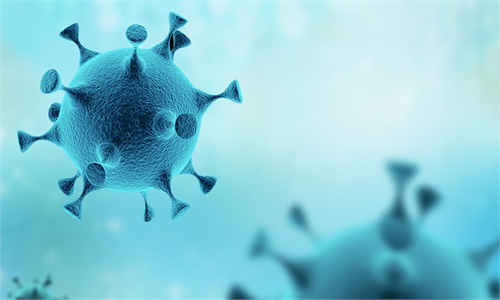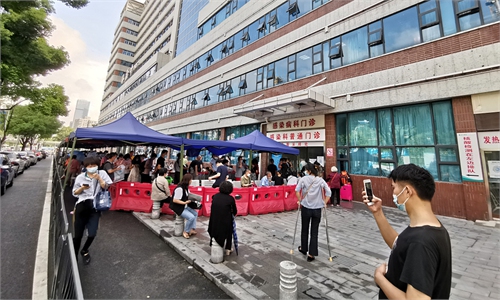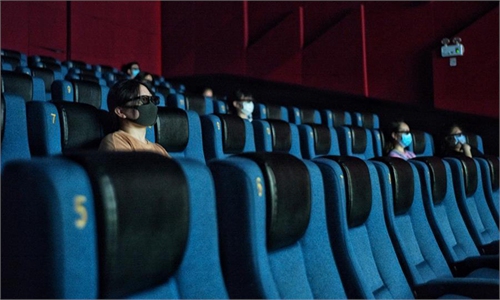“We know better than anyone else how to protect ourselves,” Wuhan people handle current COVID-19 flare-up with high vigilance, organized manner
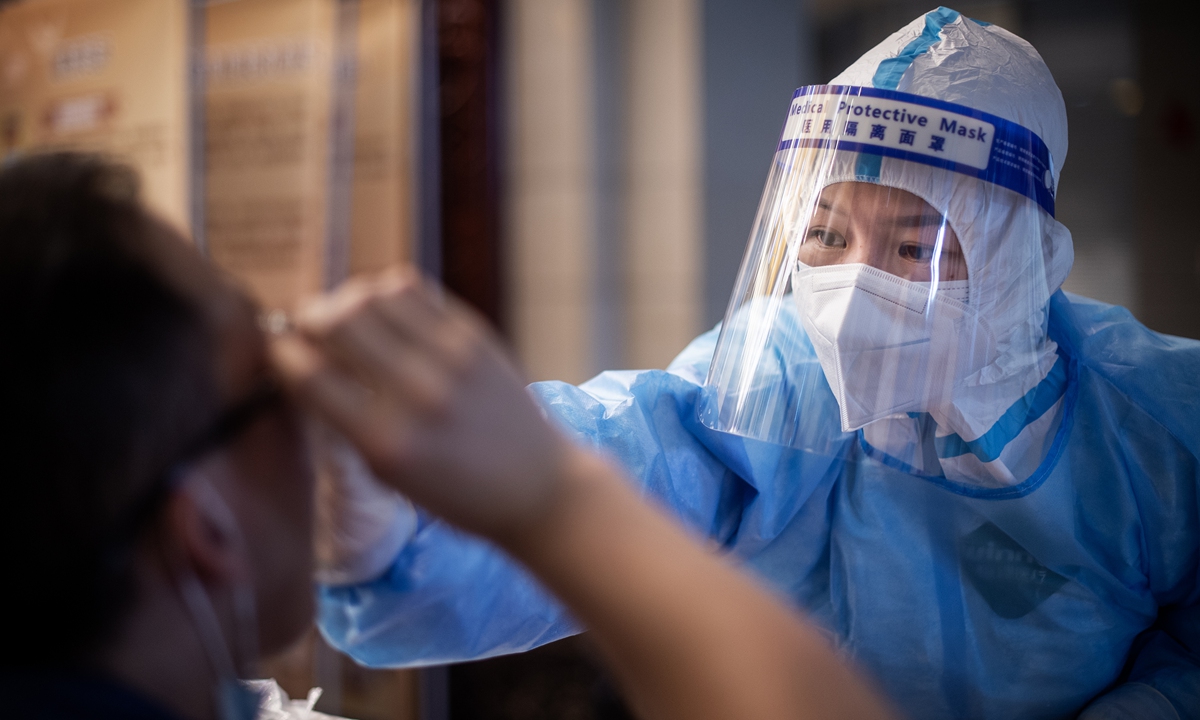
A medical staff takes the nucleic acid test for a local resident in Dongxihu District in Wuhan, central China's Hubei Province. Photo: The Paper
In roughly 48 hours after only seven domestically transmitted COVID-19 cases were detected, Wuhan, a city of 11 million, announced citywide nucleic acid testing, canceled offline education activities and halved tourist flows at major scenic spots. To other parts of the world that are used to hundreds or even tens of thousands of daily infection cases, the reaction may seem like making a mountain out of molehill. But for Wuhan, it all makes so much sense.
A few hours after Wuhan authorities announced the seven domestic cases on Monday, Wuhan's local health code crashed, as torrents of visitors checking to see if they had contacted with confirmed cases pushed it beyond its limits.
"My heart was in my mouth before I finally saw the system shows I was safe," said Wuhan resident Luo Ning. Yet she still applied to work from home on Tuesday, saying it is "better not go around now, it's dangerous outside."
The fresh outbreak of the invisible virus is like a bombshell to a city that has already been severely traumatized, although it had not reported any new domestic cases since June 2020. The usually crowded subways and buses have been empty for the past two days. In shopping malls, shop assistants far outnumbered visitors and some restaurants have closed temporarily, several Wuhan residents told the Global Times.
"The look of the city, suddenly so empty, threw me back to the first days of coronavirus," said Luo.
A video went viral online on Wednesday showing a Wuhan taxi driver, wearing a facial mask and a pair of gloves, chasing and spraying disinfectant on a passenger as she was getting in his vehicle. The driver did not stop until the passenger lifted her feet to have the soles of her shoes sterilized.
"People started to stockpile food, disinfectant and masks, but in an orderly fashion. Nobody was snatching stuff or anything," said Chen Jingyuan, a local resident in her 30s, who described Wuhan residents as coping with the flare-up "in an organized manner… because Wuhan people are quite experienced in dealing with a situation like this."
Wuhan government officials assured the public since Tuesday that the city has a sufficient stock of daily necessities, and that prices for those commodities will not go up.
The Central China city swiftly kicked off citywide testing on Tuesday. Li Tao, deputy secretary-general of Wuhan city government, said at a Tuesday conference that Wuhan is an "important transportation hub," thus the citywide testing will "eradicate hidden danger."
Wuhan government announced on Wednesday night that 2.52 million samples were collected as of Wednesday noon.
Cheng Cai, a doctor at Wuhan Tongji Hospital who fought the virus for more than two months in 2020, told the Global Times that some doctors and nurses from his hospital were sent to conduct nucleic acid testing for local residents.
Zheng Jing, another Wuhan doctor, pulled all-nighters from Tuesday to Wednesday to do the COVID-19 test for residents. "Several thousand samples can be taken within one hour," said Zheng, who joked that the process is like having a "free sauna," as medical workers are enveloped in thick personal protective suits despite Wuhan's notoriously hot and humid summer. "We can't complain. I know the city can't afford to another outbreak."
Wuhan, capital of Central China's Hubei Province, is the city that bore the earliest and heaviest blow of COVID-19 in China. The city imposed a 76-day lockdown from January 23 to April 8 in 2020 and had not recorded any local cases since June 2020. It had its first round of citywide test in June 2020, which found 300 asymptomatic patients. The city cleared all confirmed and asymptomatic cases after June 15, 2020.
In addition to the seven confirmed cases, Wuhan detected nine new cases on Wednesday, and the local health authority said the same day that the Wuhan flare-up is caused by the Delta variant. The virus sequencing is highly similar to that from the epidemic outbreak in East China's Jiangsu Province.
Li Tao said on Wednesday that Wuhan has guaranteed 31,300 isolation rooms and promised another 9,000 for the next three days. The city government announced on Wednesday it will lock down 56 residential communities and 11 construction sites linked to detected cases.
"The seemingly hilarious panic of Wuhan people should not be chided at or mocked. We are the ones who experienced the most helpless and darkest times, we obeyed the mask mandate longer than any city… we are even prepared to stay put in our houses again if the government requires it," a Wuhan resident surnamed Dong told the Global Times on Wednesday.
Dong said that Wuhan people's response precipitated by the unforgettable start to 2020. "We know better than anyone else how to protect ourselves," he said.
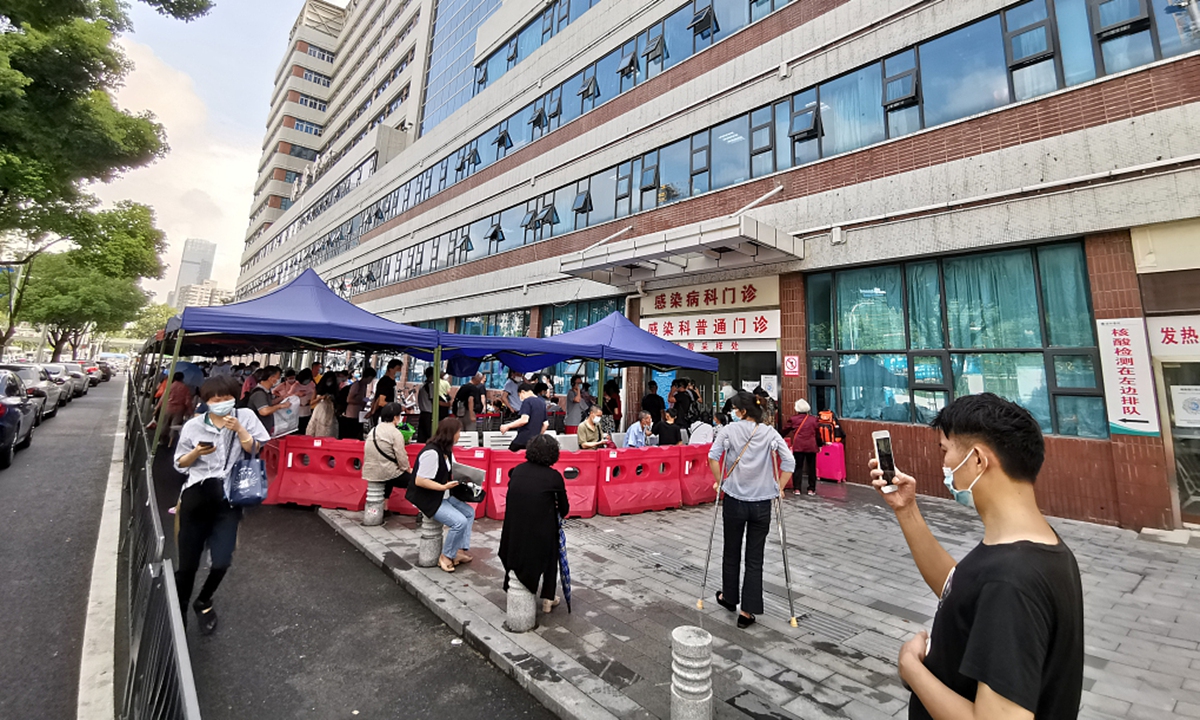
Full confidence
China is grappling with its worst resurgence of COVID-19 since the initial outbreak in Wuhan, with more than 300 cases detected in more than two dozen cities across the country.
The Wuhan flare-up also hit the headlines of many foreign media, which described the city's response as overly "dramatic" and reminiscent of the first days of the COVID-19 outbreak in 2020.
Some Wuhan residents beg to differ.
Wang Wei, a social worker in Wuhan, who worked non-stop last year to fight COVID-19, has joined in the antivirus prevention effort again. She said that drawing from the experiences learned last year, social workers are strictly following procedures and not missing any single person. Anyone who shared the same itinerary as someone returning from high-risk areas must be quarantined.
As social workers, we can take this one more easily, Wang said, noting that she and some co-workers sometimes made jokes that after the days of struggle in 2020, it would be "a piece of cake" now to curb the epidemic flare-up.
Epidemiologists said that China will not suffer another severe outbreak as it did last year.
"We are still in the early stage of this latest outbreak and cannot estimate the exact scale… But now the country has garnered more experience and knowledge about the virus, and we have a complete system to screen cases and their close contacts. So although the number is swelling, the outbreak is under control," Wang Guangfa, a respiratory expert at Peking University First Hospital who was a member of the WHO-China joint expert team in Wuhan February, 2020 told the Global Times.
Wang also said now is the "golden period" in containing the outbreak as it is still in the preliminary stage, which requires governments at all levels to stay vigilant, cautious and plug any possible loopholes. "Thus Wuhan's citywide test is not dramatic, from an epidemiological perspective," Wang said. "Moreover, the city is sensitive to the virus, and people are liable to accept stricter measures so they are more assured."
Wuhan's swift response has won kudos among many residents, as they said timely and effective measures will prevent the reoccurrence of last year's "nightmare."
Luo said the loudspeakers in her residential community trumpeted a slogan: As the heroic city of Wuhan have beaten the COVID-19 one time, it can beat it any number of times.


